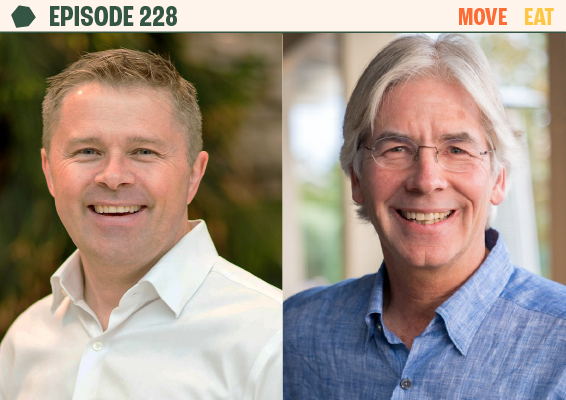In Episode #230, I’m joined by ecologist Nicholas Carter to examine the role of dairy and other animal foods on the environment.
“The dairy industry, as big as it is, is probably the most vulnerable to major disruption.”
Over the course of recent episodes, we’ve worked towards building a more comprehensive picture of the topics covered. Alongside some incredible guests, we’ve covered the theory, mechanisms, and implementation of exercise, and this episode we continue building out this broader view with dairy. In Episode #225, Dr Alan Flanagan honed in on the health implications of dairy. Today, I sit down with Nicholas Carter to examine the planetary effects of dairy production and consumption, helping you make more informed decisions in support of sustainability.
Nicholas Carter is an ecologist and co-founder of PlantBasedData.org, a library of peer-reviewed articles and summaries on the environmental, health, economic, and zoonotic disease evidence to shift towards plant-based diets. He is actively involved in education, empowerment, and climate communications initiatives, and has featured as a panellist and speaker at high-profile events. As an audience favourite, Nicholas Carter communicates important environmental messages with clarity and evidence, helping many people in The Proof community make more sustainable choices.
“Since industrialisation, methane has warmed the planet anywhere from about 33% to as high as 44%.”
In this episode, Nicholas Carter explains the implications of our food choices before detailing the impact of dairy specifically. He breaks down the ways we measure environmental impact, and the strengths and shortfalls of these systems. We also cover “carbon neutral” dairy, regenerative grazing, biodiversity loss, and much more.
Specifically, we discuss:
- Intro (0:00)
- What Causes Climate Change (2:22)
- Agriculture Today vs in the Past (7:06)
- Biodiversity Loss (11:28)
- Incentives for Sustainability (17:26)
- Cattle Grazing & Wildfires (25:15)
- Red Meat & Dairy (28:40)
- Global Dairy Production (30:55)
- Myths about Regenerative Agriculture (36:03)
- Comparing Sheep/Cow Milk (45:46)
- ‘Carbon Neutral’ Dairy (47:35)
- Milk Substitutions (58:50)
- Precision Fermentation (1:06:36)
- Diet for Planetary Health (1:10:22)
- Future of Food (1:16:23)
- Outro (1:22:12)
I hope you leave this conversation feeling inspired to make food choices that better support our planet’s health. With an abundance of resources available to aid you in this transition, every substitution counts.
To connect with or reach out to Nicholas Carter, you can find him on Twitter and Instagram. For more information on environmental welfare, find an abundance of resources and summaries of the most reputable research on Nicholas’ website, https://www.plantbaseddata.org/. Make sure to check out the additional resources below, and listen to Episode #225 with Alan Flanagan to learn about the human health aspect of dairy consumption.
The best way to support the show is to use the products and services offered by our sponsors. To check them out, and enjoy great savings, visit theproof.com/friends.
Enjoy, friends.
Simon
More about Nicholas Carter
Nicholas Carter is an ecologist and co-founder of PlantBasedData.org, a library of peer-reviewed articles and summaries on the environmental, health, economic, and zoonotic disease evidence to shift to plant-based diets. He’s recently prepared a scientific report for World Animal Protection, including carbon modeling with Navius Research, on the impacts and opportunities with agriculture in Canada. He’s on the advisory board of the Eco Cooks Club, an educational program to empower youth to take climate action by connecting how our food choices impact the planet. He’s also helped launch and leads climate communications for a data centre that’s part of the Canadian Centre for Climate Services.
Nicholas was recently a Center for Biological Diversity panelist alongside Dr. Tara Garnett from Oxford University, and a speaker at the launch of the documentary Meat the Future along with the Jane Goodall Institute, the Good Food Institute, and BluNalu. His research during his master’s degree in environmental practice focused on the global greenhouse gas emissions that are attributed to animal agriculture. He’s since written and been interviewed for The New Republic, Plant Based News, Plant Proof, Sentient Media, Forbes, The Globe and Mail, Macleans, and Planet Friendly News. Transitioning to plant-based farming systems has also been a focus where he’s written about regenerative plant farming practices with A-Well-Fed World.
Additional resources, supporting studies
Nicholas Carter has provided extensive resources and studies to further your knowledge and evaluate the evidence. Find these resources, plus additional notes and takeaways, below.
Animal Agriculture and The Paris Agreement
We will not achieve the Paris 1.5 degrees C climate goal without addressing animal agriculture:
- Food in the Anthropocene: the EAT–Lancet Commission on healthy diets from sustainable food systems • The Lancet
- Food systems in a zero-deforestation world: Dietary change is more important than intensification for climate targets in 2050 • PMID: 32474248
- Global food system emissions could preclude achieving the 1.5° and 2°C climate change targets • Science
- Including animal to plant protein shifts in climate change mitigation policy: a proposed three-step strategy • Taylor & Francis
- Options for keeping the food system within environmental limits • Nature
- Scientists call for renewed Paris pledges to transform agriculture • The Lancet
- Key takeaway: “If the livestock sector were to continue with business as usual, this sector alone would account for 49% of the allowed emissions to keep warming to 1.5C by 2030.”
- The Importance of Reducing Animal Product Consumption and Wasted Food in Mitigating Catastrophic Climate Change • ResearchGate
- Key takeaway: “If global trends in meat and dairy intake continue, global mean temperature rise will more than likely exceed 2°C, even with dramatic emissions reductions across non‐agricultural sectors.”
Biodiversity
- Assessing the impacts of livestock production on biodiversity in rangeland ecosystems • PNAS
- Biodiversity and Wildlife • Our World in Data
- Biodiversity conservation: The key is reducing meat consumption • Science of the Total Environment
- Human carnivory as a major driver of vertebrate extinction • Perspectives in Ecology and Conservation
- Key takeaway: “The livestock sector is currently the single major driver of habitat loss and degradation, which is in its turn a leading cause of species decline and extinction worldwide.”
- Key takeaway: the “past and present processes by which human carnivory threatens the world’s biodiversity makes it arguably the most detrimental aspect of our ecology, from a conservation point-of-view.”
- Meat and Dairy Production • Our World in Data
- Redefining agricultural yields: from tonnes to people nourished per hectare • Environmental Research Letters
- Cycling crops through animals at ~10% conversion rate
- Reducing food’s environmental impacts through producers and consumers • Science
- Largest meta-analysis on our food system to date, looking at over 38,000 farms in 119 countries representing 90% of all foods.
- Key takeaways:
- 83% of all agricultural land is used for animal agriculture.
- Shifting entirely away from animal agriculture would free up more than 3 billion hectares of land, equivalent to the continent of Africa.
- The biomass distribution on Earth • PNAS
- Key takeaway: 60% of all mammals on Earth are livestock (mostly cattle and pigs), 36% are human, and just 4% are wild animals.
- The effects of livestock grazing on biodiversity are multi-tropic: a meta-analysis • PMID: 2369874
Bison vs cattle
Bison would have contributed to warming historically, but the other ecological benefits of them living in a biodiverse abundant wild ecosystem, with a mix of predators, bring all kinds of benefits:
- Are cows just domestic bison? Behavioral and habitat use differences between cattle and bison • Western Watersheds Project
- Grazed and Confused • Oxford University, p. 81
- How Livestock Differs From Wildlife • The Wildlife News
- Other benefits of rewilding with wild bison where natively appropriate • Twitter thread
- Permanent removal of livestock grazing in riparian system benefits native vegetation • Global Ecology and Conservation
- Study comparing vegetation changes at 180 sites along three connected waterways in northern Victoria, Australia that had been extensively grazed by livestock under grazing licences.
- Survey of livestock influences on stream and riparian ecosystems in the Western United States • Journal of Soil and Water Conservation
Commercial Production and Consumption
- Addressing food-related consumption-based emissions in C40 Cities • C40 Knowledge Hub
- Can You Trust a Pro-Beef Professor? It’s Complicated. • Undark
- The climate responsibilities of industrial meat and dairy producers • Springer Nature
- Unintentional unfairness when applying new greenhouse gas emissions metrics at country level • Environmental Research Letters
- Net Zero & GWP*
Dairy
- Antibiotic residues in milk: Past, present, and future • PMID: 31583228
- Are We Approaching Peak Meat Consumption? Analysis of Meat Consumption from 2000 to 2019 in 35 Countries and Its Relationship to Gross Domestic Product • MDPI
- Milking the Planet: How Big Dairy is Heating Up the Planet and Hollowing Rural Communities • Institute for Agriculture & Trade Policy
- Key takeaway: thirteen of the world’s largest dairy corporations combined to emit more greenhouse gases (GHGs) in 2017 than major polluters BHP, the Australia-based mining, oil and gas giant or ConocoPhillips, the United States-based oil company.
Dietary Shifts and Substitutions
- Analysis and valuation of the health and climate change cobenefits of dietary change • PNAS
- Key takeaways: a global switch to vegetarian diet would save 7.3 million lives per year by 2050, and a global switch to a vegan diet would save up to 8.1 million lives per year by 2050.
- Considering Plant-Based Meat Substitutes and Cell-Based Meats: A Public Health and Food Systems Perspective • Frontiers in Sustainable Food Systems
- Country-specific dietary shifts to mitigate climate and water crises • Global Environmental Change
- Dairy vs. plant-based milk: what are the environmental impacts? • Our World in Data
- Diets for a Better Future • PlantBasedData
- Food Planet Health • EAT-Lancet
- Labriculture Now • Logic
- Soy • Our World in Data
- Key takeaway: only 6% of soy grown goes to human food. 81% of soy processing is in the form of cake. 99% of that goes to farmed animals.
Greenhouse Gases
- Direct measurements of methane emissions from grazing and feedlot cattle • PMID: 10375217
- Key takeaway: “higher CH4 production (about four times) for cattle receiving low-quality, high-fiber diets than for cattle fed high-grain diets.”
- IPCC AR6: Summary for Policymakers • Intergovernmental Panel on Climate Change
- See p. 7 (chart), which shows methane has contributed 0.5°C of the 1.1°C of warming to date.
- Scientists call for renewed Paris pledges to transform agriculture • The Lancet
- Key takeaway: the best way of drawing down carbon from the atmosphere is forests, mangroves, and rewilding to native ecosystems.
- “Restoring natural vegetation such as forest is currently the best option at scale for removing CO2 from the atmosphere… The livestock sector, having largely displaced natural carbon sinks, continues to occupy much of the land that must be restored.”
- Soil carbon sequestration accelerated by restoration of grassland biodiversity • Nature Communications
- The carbon opportunity cost of animal-sourced food production on land • Nature Sustainability
Regenerative Grazing
- Grazing and associated monocultures of cheatgrasses amplifies risks of fires in certain dry regions • Springer
- Stimulation of NO emission by manure application to agricultural soils may largely offset carbon benefits: a global meta-analysis • Global Change Biology
- Manure applications in regenerative grazing, this global meta-analysis showed that it increases N2O by ~32% compared with mineral fertilizers. This further complicates this polarizing topic.
- The Regenerative Ranching Racket • Medium
Wider Ecological Impacts of Animal Agriculture Beyond CO2
32-40% of annual human-caused methane (CH4) emissions come from animal agriculture.
- Global Methane Assessment: Benefits and Costs of Mitigating Methane Emissions • United Nations Environment Programme
- Key facts and findings • Food and Agriculture Organization of the United Nations







